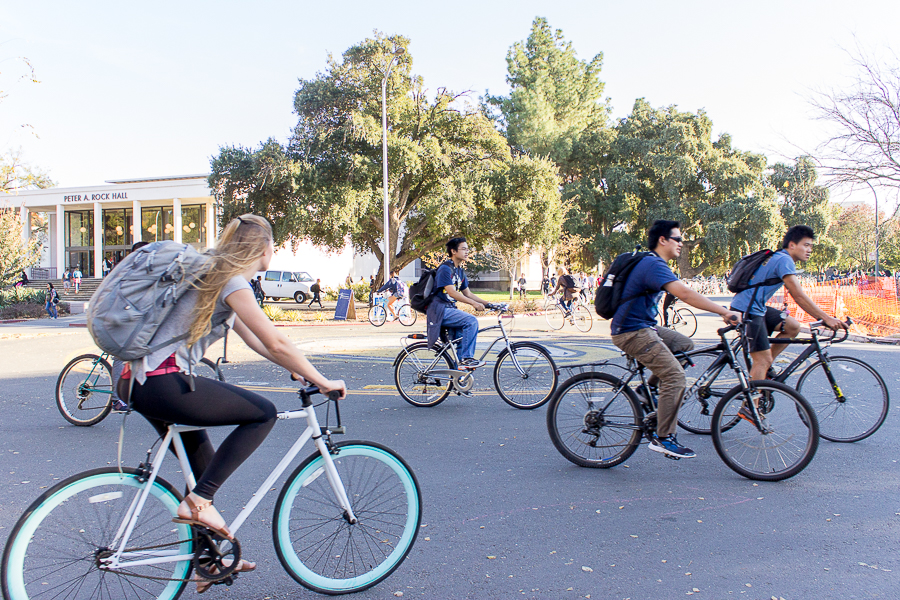
Results reveal a decrease in the university’s carbon footprint
Over the past eight years, UC Davis has sent an annual questionnaire to a sampling of faculty, students and staff asking about their means of travel to campus, their length of commute and more. The survey, titled the Campus Travel Survey, is a joint project between Transportation Services (TAPS) and the Institute of Transportation Studies (ITS) at UC Davis.
The most recent survey for the 2016-2017 school year was distributed on Oct. 31 by Interim Provost and Executive Vice Chancellor Ken Burtis. Results of the travel survey from last fall were released in late October. The results were detailed last month by Eric Gudz, a recent graduate of the ITS, and Drew Heckathorn, a current graduate student in the ITS.
The survey revealed that as the number of people traveling to campus has increased in the past year while the number of people driving alone to campus has fallen. The overall carbon footprint shrank, from 7.8 pounds of carbon-dioxide-equivalent per capita each weekday in the 2014 to 2015 school year to 7.2 pounds per capita in 2015 to 2016.
From the 2014 to 2015 to the 2015 to 2016 school year, 1.7 percent more people traveled to campus in general, 0.3 percent fewer people bicycled and 0.5 percent more people walked or skated. 1.5 percent fewer people drove alone and 1.2 percent of people rode buses more often. 45.3 percent of the campus community reported mostly biked to campus.
Drew Heckathorn, a graduate student researcher and masters student within the Transportation Technology and Policy Department, said that these results show that UC Davis is a leader in sustainability.
“The results obtained last year continue to support UC Davis’ reputation as a sustainable transportation leader,” Heckathorn said. “UC Davis claims the least amount of personal vehicles brought to campus per capita than any other UC campus with reported information, which means more people biking, taking transit, walking and carpooling.”
Luis Armenta, third-year psychology and neurobiology, physiology and behavior double major, has been biking to campus for three years now and feels that it is the best way to get to school and commute within campus.
“Riding a bicycle to class makes up for the 30 minutes of exercise a day that is hugely recommended,” Armenta said. “Buses get really crowded during prime time, so skipping that is a blessing.”
For this year’s survey, Heckathorn said that they added a few questions to see people’s perceptions and attitudes towards biking as well as some questions regarding emerging technologies such as ridesharing services like Uber and Lyft. These additional questions were guided by research conducted by Ph.D. students associated with the Institute of Transportation Studies.
The results of this survey affected the Long Range Development Plan (LRDP), in particular the commute mode share and geographic distribution of commuters, to inform the transportation element of the plan. The LRDP intends on reducing the number of drive-alone commute trips to campus, and these results are helpful in showing the current level of drive-alone commuting and the geographic distribution of these trips.
Director of Transportation Services Clifford Contreras believes that this survey helps the campus understand its transportation options better to make improvements.
“The feedback generated from the annual Travel Survey is important to shaping the future of transportation on campus,” Contreras said. “Responses from the survey over the past eight years have resulted in a number of transportation infrastructure and program improvements that have shifted our mode share splits to more sustainable modes. It’s the continued growth of these preferred modes that will assist the campus in achieving its goals of reducing traffic congestion, greenhouse gas emissions and vehicle miles traveled.”
Written by: Demi Caceres — campus@theaggie.org




